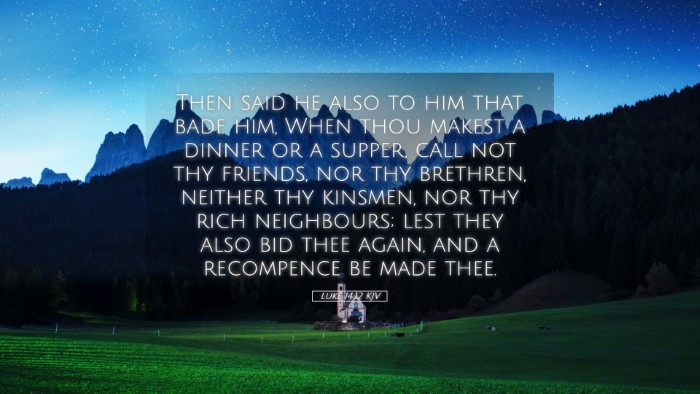Commentary on Luke 14:12
Verse: "Then said he also to him that bade him, When thou makest a feast, call not thy friends, nor thy brethren, neither thy kinsmen, nor thy rich neighbours; lest they also bid thee again, and a recompence be made thee."
Introduction
In this verse, Jesus addresses the heart of the host, pushing beyond societal norms and introducing a radical concept of hospitality. This commentary draws upon insights from Matthew Henry, Albert Barnes, and Adam Clarke, exploring the implications of this teaching for practical Christian living.
Contextual Background
Luke 14 captures Jesus’ teachings during a banquet at the house of a prominent Pharisee. It is within this setting that He demonstrates the nature of humility and the kingdom of God. This statement is juxtaposed against the prevailing customs of invitation and reciprocity.
Analysis of the Verse
Jesus instructs the host not to invite those who would expect something in return—a common practice among the wealthy and powerful of His times. This paradox challenges the traditional understanding of generosity and societal relationships.
Matthew Henry's Perspective
Henry emphasizes that Jesus calls for a radical altruism. Instead of seeking social status through connections and reciprocal relationships, he urges believers to extend grace without expectation. Henry notes:
"The spirit of this instruction is to act towards others as God acts towards us, giving without needing to receive back in kind."
Albert Barnes' Commentary
Barnes further develops this concept, explaining that Jesus advocates for a more inclusive understanding of community. He highlights that true hospitality reflects God’s love and mercy, extending invitations to the poor, the maimed, the lame, and the blind. Barnes remarks:
"In doing good to the poor and needy, we not only reflect the heart of God but also lay up treasure in heaven, where true rewards await."
Adam Clarke's Insights
Clarke adds another layer by discussing the implications of social hierarchy and the Jewish cultural context. He notes that Jesus intentionally subverts party norms by instructing hosts to invite those marginalized by society. Clarke states:
"To invite the lowly is to manifest the true spirit of the Gospel—it liberates our hearts from pride and introduces us to the grace of humility."
Theological Implications
- The Nature of Divine Generosity: The directive against inviting friends and relatives highlights the character of God's grace, which seeks the lost and the marginalized.
- Redefining Relationships: Jesus’ teaching radically redefines our understanding of relationships, prompting us to build community beyond social stratification.
- Eschatological Focus: The ultimate recompense mentioned implies a future hope in the kingdom of God, wherein every action motivated by divine love will be honored eternally.
Practical Applications
This passage offers several practical applications for pastors, students, theologians, and believers seeking to embody Christ’s teachings:
- Extend Invitations to the Marginalized: Churches and communities should actively seek to include those often overlooked, creating environments where everyone feels welcomed.
- Practice Generosity Without Expectation: Engage in acts of kindness and support for those in need, especially without the hope of reciprocation or recognition.
- Encourage a Culture of Humility: Foster discussions and teachings that propound humility and service over status and achievement within church communities.
Conclusion
Luke 14:12 serves as a poignant reminder of the values inherent in the kingdom of God. Each commentator, in their unique way, leads us to understand the depth of what it means to live out the teachings of Christ in relational contexts. Their insights reflect a call to transformative action that resonates deeply with the essence of the Gospel.


